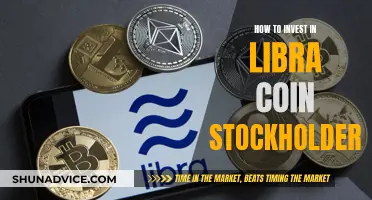
Bitcoin is a highly volatile asset, and its value has seen numerous highs and lows since its launch in 2009. If you had invested $1,000 in bitcoin on January 1, 2020, when it was valued at $7,160, you would have been able to purchase 0.13966 bitcoin. By December 23, 2020, the price of bitcoin had surged to $23,605, making your 0.13966 bitcoin worth $3,296.67, a 230% return on your investment. However, the value of bitcoin has also experienced significant drops, and investing in it is very risky.
What You'll Learn

How much Bitcoin can you buy with $1000?
The amount of Bitcoin you can buy with $1000 will depend on the price of Bitcoin at the time of purchase. Cryptocurrencies are highly volatile, so the price of Bitcoin can fluctuate significantly over time.
For example, if you had invested $1,000 in Bitcoin at the beginning of 2021, when the price of Bitcoin was $29,290, you would have been able to purchase 0.034 tokens. By the end of the year, when the price of Bitcoin had increased to $49,150, those 0.034 tokens would have been worth about $1,632.
As of August 2024, $1000 would buy you 0.01826 BTC. The highest amount you would have been able to purchase in the last 30 days was 0.01942 BTC, and the lowest was 0.01437 BTC.
It's important to remember that investing in cryptocurrencies carries a high level of risk due to their volatile nature. The value of your investment can decrease as well as increase, and you should only invest what you can afford to lose.
A Beginner's Guide: Investing in Bitcoin with Vanguard
You may want to see also

How has Bitcoin performed over time?
Bitcoin has had a volatile trading history since its creation in 2009.
In its early years, from 2009 to 2012, Bitcoin's price was next to nothing. In October 2009, the first transaction gave Bitcoin a value of $0.0009. In May 2010, the first "real-world" transaction took place, when two pizzas were purchased for 10,000 Bitcoins, valuing each Bitcoin at four-tenths of a cent. Bitcoin's price remained under $1 until February 2011, when it experienced a spike, reaching $30 in June 2011, before dropping back down to $5.
In 2013, Bitcoin started to gain traction, with exchanges like Mt. Gox handling 70% of all transactions by the end of 2014. This increased adoption led to a surge in Bitcoin's price, and it breached $1,000 for the first time in November 2013. However, Mt. Gox experienced a security breach in 2014, causing Bitcoin's value to slump to around $300 by the end of that year.
From 2015 to 2016, Bitcoin's growth slowed, and it closed 2016 at around $1,000. In 2017, Bitcoin started to gain more mainstream attention, with media coverage drawing in retail customers. As a result, Bitcoin's price soared, breaking through several price barriers and reaching nearly $19,000 in December 2017.
However, 2018 and 2019 were relatively inactive years for Bitcoin, with its price closing below $4,000 in 2018 and around $7,000 in 2019, leading some to write off Bitcoin as a fad.
The Covid-19 pandemic in 2020 caused a sharp drop in Bitcoin's price, as it shed 50% of its value in less than 48 hours, trading below $4,000. However, Bitcoin made a remarkable recovery in the latter part of 2020, shattering its previous all-time high and ending the year at around $29,000.
Bitcoin's price continued to surge in early 2021, reaching new highs of over $60,000. However, since then, Bitcoin has experienced a freefall, with the crypto winter and the collapse of stablecoins like TerraUSD causing a sharp decline in its value. As of mid-2024, Bitcoin's price is struggling to rise above $20,000.
Despite its volatile history, Bitcoin has been one of the best-performing assets over the last decade, with a return of more than 230% over a 10-year period. Its price journey has been far from smooth, with violent dips and pumps along the way.
Best Bitcoin ETFs: Where to Invest Your Money
You may want to see also

What are the risks of investing in Bitcoin?
Investing in Bitcoin comes with a variety of risks that you should be aware of before committing your money. Here are some of the key risks to consider:
Volatility and Fluctuations
The Bitcoin market is known for its volatility and constant fluctuations. The price of Bitcoin can change rapidly and unpredictably, making it difficult to determine whether you will get a return on your investment. The value of Bitcoin is influenced by various factors, including sentiment, speculation, and market manipulation, which can lead to wild swings in price. Therefore, it is essential to closely monitor the market and make well-informed, cautious investment decisions.
Cyber Security and Hacking
Bitcoin is a technology-dependent investment, which makes it vulnerable to cyber-attacks and hacking. The lack of central authority and regulation in the Bitcoin market means that there is a higher risk of hacking and cyber fraud. If your Bitcoin wallet is hacked or your private key is compromised, you may lose your investment with little recourse for recovery. It is crucial to research and invest in secure wallets and storage solutions to mitigate this risk.
Fraud and Scams
The Bitcoin market has seen a fair share of fraud and scams. With the rise in popularity, fake exchanges and fraudulent transactions have emerged, duping unsuspecting investors out of their Bitcoins. The lack of clear regulations and central authority makes it challenging to protect yourself from such scams. It is important to carefully research exchanges and transactions to minimize the risk of fraud.
Regulatory Uncertainty
The Bitcoin and cryptocurrency market currently operates with little to no major regulations. The lack of a clear regulatory framework creates uncertainty for investors. Governments and regulatory bodies are still figuring out how to approach cryptocurrencies, and future regulations could significantly impact the value of Bitcoin or even lead to restrictions or bans. Tax treatment is also a concern, as the tax obligations for Bitcoin investments are not always clear, and they vary across jurisdictions.
Technology Reliance and System Failures
Bitcoin is entirely reliant on technology, and any disruptions or failures in the underlying systems can impact your investment. Issues with digital wallets, exchanges, or the blockchain technology itself could lead to losses. Additionally, the absence of physical collateral means that, unlike traditional investments, Bitcoin has no tangible backup if the technology fails.
Peer-to-Peer Transaction Risks
Bitcoin transactions often occur directly between parties, without the involvement of intermediaries or clearing services. In such cases, all risks associated with the transaction lie with the parties involved. Double-selling, for example, is a risk in peer-to-peer transactions, and there may be limited recourse if issues arise.
Loss of Confidence and Competition
Bitcoin and other cryptocurrencies are part of a new and rapidly evolving industry. The value of these currencies is based solely on market participants' perceived value, with no backing from central banks or other traditional institutions. A loss of confidence in digital currencies could lead to a collapse in trading activities and a sharp drop in value. Additionally, the emergence of competing cryptocurrencies or forks in the blockchain could dilute the value of your Bitcoin investment.
Bitcoin Halving: Pre- or Post-Event Investment Strategy?
You may want to see also

How do you buy Bitcoin?
Investing in Bitcoin can be a risky move, but it has paid off for some. For example, if you had invested $1,000 in Bitcoin on January 1, 2020, you would have made a return of 230% on your investment by December 23, 2020.
If you are interested in buying Bitcoin, there are several ways to do so. Here is a step-by-step guide:
Choose a Cryptocurrency Exchange
Firstly, you will need to decide on a cryptocurrency exchange to use. Some popular options include Gemini, Kraken, Coinbase, and Crypto.com. These platforms typically offer a variety of cryptocurrencies to choose from and differ in the fees and consumer protections they provide, so be sure to research the options before selecting one.
Set Up an Account
Once you have chosen an exchange, you will need to create an account. This usually involves providing personal information, such as your name, email address, and sometimes even your Social Security number. You will also likely need to fund your account by linking a bank account or debit/credit card. Keep in mind that it is generally not recommended to fund your Bitcoin purchases with a credit card, as you could be stuck with high-interest debt if the value of Bitcoin drops.
Make Your Purchase
After setting up your account, you can start purchasing Bitcoin. The process will vary depending on the exchange, but you will typically need to place a buy order, specifying the amount of Bitcoin you want to buy. Be sure to pay attention to any fees that the exchange may charge for executing the transaction.
Store Your Bitcoin in a Digital Wallet
Once you have purchased Bitcoin, you will need to store it in a digital wallet. There are two main types of wallets: hot wallets and cold wallets. Hot wallets are typically provided by trusted exchanges or providers and allow for faster transactions. However, they are also more attractive targets for hackers. Cold wallets, on the other hand, are small, encrypted portable devices that allow you to carry your Bitcoin with you. They are considered more secure but may incorporate additional security steps that slow down transactions.
Consider Your Investment Strategy
Finally, think about your investment goals and strategy. Bitcoin can be used as an investment or a medium of exchange. If you plan to spend your Bitcoin, you can use it with retailers and digital services that accept cryptocurrency as payment. If you are investing, you can choose to hold onto your Bitcoin long-term or engage in day trading, buying and selling frequently in an attempt to profit from price movements.
Remember that investing in Bitcoin comes with risks, and the price can be highly volatile. Always do your research and carefully consider your financial situation before investing.
Investing in Bitcoin: Is $100 Enough to Get Started?
You may want to see also

What are the alternatives to investing in Bitcoin?
Bitcoin is a cryptocurrency, a digital currency that uses cryptographic technics to create and process tokens or coins. It is the most famous and dominant cryptocurrency in terms of market capitalization, user base, and popularity. However, there are many alternatives to Bitcoin that are built on a decentralized peer network. These alternatives, known as altcoins, have newer features such as handling more transactions per second or using different consensus algorithms. Here are some of the alternatives to investing in Bitcoin:
- Ethereum (ETH): Ethereum is a decentralized software platform that enables smart contracts and decentralized applications (dApps). It uses ether, its platform-specific cryptographic token, as a payment method and for investment. As of August 25, 2023, Ether's market cap was around $199 billion, making it the second-largest digital currency by market capitalization after Bitcoin.
- Tether (USDT): Tether is one of the first and most popular stablecoins, which are cryptocurrencies that aim to reduce volatility by pegging their market value to a currency or other external reference points. Tether's price is tied directly to the US dollar, making it less volatile than Bitcoin. As of July 22, 2023, Tether was the third-largest cryptocurrency by market capitalization.
- XRP (Ripple): XRP is the native token for the XRP Ledger, a payment system created by Ripple in 2012. It uses a consensus mechanism called the XRP Ledger Consensus Protocol, which does not rely on proof-of-work or proof-of-stake for consensus and validation. As of July 22, 2023, XRP had a market cap of about $39.3 billion.
- Binance Coin (BNB): Binance Coin is a utility cryptocurrency that serves as a payment method for fees associated with trading on the Binance Exchange. It is the third-largest cryptocurrency by market capitalization. As of July 22, 2023, Binance Coin had a market capitalization of $37.3 billion.
- USD Coin: USD Coin is a stablecoin that pegs its price to the US dollar using fiat-collateralized reserves. It was launched in 2018 by the Centre Consortium, which consists of Circle and Coinbase. As of July 22, 2023, USD Coin had a market cap of $30.8 billion.
- Cardano (ADA): Cardano is a proof-of-stake cryptocurrency created by engineers, mathematicians, and cryptography experts. It aims to be the world's financial operating system by establishing DeFi products. As of July 22, 2023, Cardano had a market capitalization of $10.9 billion, making it the seventh-largest cryptocurrency.
- Solana (SOL): Solana is a blockchain platform designed to support decentralized applications (dApps). It performs more transactions per second than Ethereum and charges lower transaction fees. The cryptocurrency running on the Solana blockchain is called Solana (SOL), which has risen tremendously in price since its inception. As of July 22, 2023, Solana had a market capitalization of $8.4 billion, making it the eighth-largest cryptocurrency.
- Dogecoin (DOGE): Dogecoin, often seen as the original "memecoin," gained popularity in 2021 as its price skyrocketed. It is accepted as a form of payment by some major companies. As of July 22, 2023, Dogecoin's market capitalization was $9.9 billion, making it the ninth-largest cryptocurrency.
- Shiba Inu (SHIB): Shiba Inu is a memecoin inspired by Dogecoin that rose to prominence in the fall of 2021, briefly surpassing Dogecoin's market capitalization.
- TRON (TRX): TRON is a blockchain platform that provides digital content makers with full ownership rights through tokenization and dApps. Its native token, TRX, is used for on-chain transactions and as a payment method on exchanges. As of July 22, 2023, TRX had a value of $0.085 and a market cap of $7.64 billion.
These are just a few examples of the many alternatives to Bitcoin. Each cryptocurrency has its unique features, and their values vary compared to the US dollar and other international currencies. It is important to carefully consider the risks and potential rewards before investing in any cryptocurrency.
Short-Term Crypto Investments: Which Digital Coins to Pick?
You may want to see also
Frequently asked questions
You will be able to purchase a fraction of a Bitcoin. The amount of Bitcoin you can buy will depend on the current market price. For example, if Bitcoin is trading at $50,000, $1,000 will buy you 0.02 Bitcoin.
Bitcoin is a highly volatile asset, meaning its price can fluctuate significantly. This means you could make large gains, but also large losses. Seasoned investors like Mark Cuban and Warren Buffett have warned that Bitcoin's value is unstable and that it has no underlying rate of return.
Bitcoin has been one of the best-performing assets of the last decade, with returns far outpacing the broader market and popular large-cap stocks. Investing a small amount in Bitcoin can be a great learning opportunity and a way to diversify your portfolio.
You can purchase Bitcoin through major cryptocurrency exchanges or brokerage firms, such as Coinbase or Robinhood. You will need to create an account, deposit funds, and then place a buy order for the amount of Bitcoin you want to purchase.







